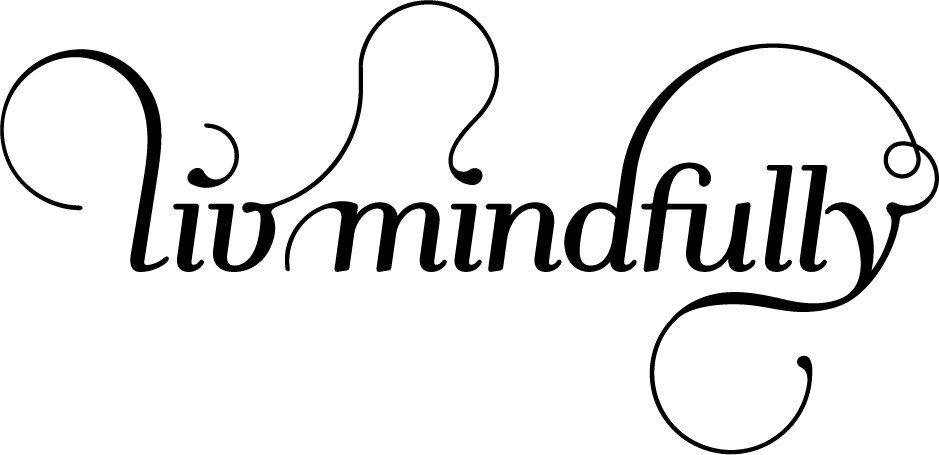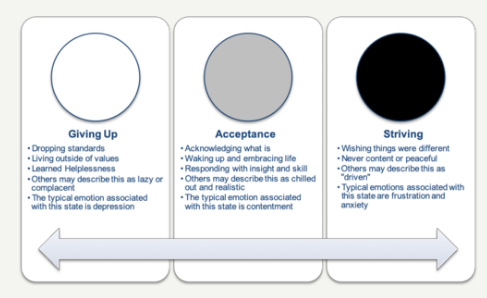THE APPLICATION OF THE ANCIENT WISDOM OF ACCEPTANCE IN OUR MODERN LIVES
Originally posted 2013
I feel like the term “acceptance” is deeply misunderstood in our modern world. And yet, it is such a wonderfully powerful attitude to develop and I am sure we would all generally have a happier and more fruitful existence if we were to nurture this skill. So, let me be really clear, from the perspective of mindfulness, acceptance….….is not:
· Giving up or giving in
· Dropping your standards
· Liking everything
· Tolerating injustice
…..is
· Seeing things as they are and not wishing for them to be different
· Waking up to the reality of our situation
· A skill we can develop
· Easier with practice
It could be represented in a diagram where Giving Up is at one extreme and Striving is at the other. Acceptance sits somewhere in the middle, it is not an either/or scenario; it is not black and white. While we may move across this spectrum throughout our moments, days and lives, the purpose of this article is to support you to spend more time in the middle zone and less time in the exhausting “fight” at either end.
According to a well-known (and, in my opinion intuitively and experientially accurate) theory, acceptance is the final stage in the five stages of grief (Kübler-Ross). Grief comes in many shapes and sizes. We can grieve the loss of a loved one, we can grieve the loss of a dream or we can grieve the fact that somebody ate the last piece of dark chocolate without telling you.
The good news is, no matter how big or small your grief – acceptance is usually the end result. The bad news however is that in the early days, you may need to do some emotional gymnastics before you can reach this nirvana of acceptance.
According to Kubler-Ross, the emotional hoops you may go through are: Denial, Anger, Bargaining, Depression and finally Acceptance. While this theory gives us an awesome framework in which to place acceptance, and an understanding of where it can come in our emotional journey, the purpose of this article is to give you some tips to cultivate more acceptance in your life – in those everyday moments with which we are faced ….everyday.
Have you noticed we tend to spend a lot of time and energy wishing things were different? Wishing our boss were more caring, our children were better at maths or our husbands more interested in yoga? We spend a lot of time denying and resisting what is already a fact. When we do this, we are trying to force a situation to be different to how it already is, which, in turn just causes more tension and contributes to less room for real growth, happiness and healing.
Life is full of discomfort (the Buddhists refer to it as suffering) and, as humans; we are neurologically programmed to avoid this discomfort. This was an important skill to help us to survive as a species however; we are no longer running from the discomfort of tigers or lions and bears (oh my!). We are more likely to be running from the discomfort of our thoughts and feelings, the discomfort of our relationship dynamics or the discomfort of the incongruence between our actual and our ideal lives. This act of constantly trying to avoid these discomforts not only makes them stronger by creating more tension in us, it is downright exhausting. The key to managing these discomforts more effectively and thereby reducing our levels of anger, anxiety or depression is acceptance.
As detailed above, acceptance is not about giving up on your dreams and aspirations, or tolerating a life that is not in-line with your values. It is about seeing your life as it really is, accepting it and then having access to the skills to respond appropriately. How will we ever get to “there” if we never allow ourselves to truly see what “here” looks like?
Acceptance allows us to see things as they really are, rather than spending so much time being pulled off-course by our attachment to our desire that things were different.
So, how do we build this skill I hear you yelling?
Start small
Lets not launch into building this skill with the big ticket items in life, lets start small, after all, this is a new skill for many of us so taking baby steps is they key. You may like to choose a couple of simple unexpected scenarios to practice such as if a meeting you had been looking forward to was cancelled or a friend is running late for a dinner date. Use the following steps to cultivate acceptance in these scenarios.
The Steps
When you find yourself in a scenario where you are feeling frustrated, disappointed or angry, follow these steps:
1. OBSERVE – Observe the thoughts/feelings that come up for you (be aware of any thoughts around wishing things were different)
2. DESCRIBE - Describe and acknowledge these thoughts/feelings (do not judge them as good/bad or right/wrong)
3. TAKE NOTE – Take note of the facts - what is actually happening? (not what you wish had or hadn’t happened) and use this information to respond skillfully
4. BREATHE – Come back to your breath (your trusted anchor for the mind) and continue on with your day
Self Talk
There are some handy phrases you might like to start to introduce into your repertoire to encourage this new skill. Just the process of saying these things will not make you truly accept but they can act as a prompt and a reminder and they are solidifying your intention to accept - that is part of the way there already!
· “I am enough” – I accept me as I am
· “It is what it is” – this can be extended to people as well as scenarios
· “This is uncomfortable but it will pass”
· “I do not agree with it or like it but I accept it”
Practice
The best thing you can do to develop any skill is to practice it. There are two types of practice, formal and informal.
Formal practice (Meditation) - One of the great benefits of meditation or any other contemplative practice is the opportunity to practice acceptance. To watch the thoughts and feelings come and go, knowing that they will always change and accepting them for what they are. This kind of formal practice does not need to happen only when sitting on a hilltop in the lotus pose – you can practice this while doing your daily chores. For example if you are folding the laundry, watch the thoughts come and go and accept them as they are, regardless of their nature. And then, gently and with compassion, direct your attention back to your folding. Through the repetition of this simple process, your “acceptance muscle” grows stronger and stronger.
Informal practice – there will be many opportunities in your life to informally practice acceptance. Your son dropped a whole jar of vitamins on the floor? Accept it, there is no benefit to anyone in taking the journey through denial, anger and depression – just go straight to acceptance and you will be able to develop a more effective strategy to get them cleaned up.
In the words of Jon Kabat-Zinn (Full Catastrophe Living, 2009) “If we keep our attention focused on the present, we can be sure of one thing, namely that whatever we are attending to in this moment will change, giving us the opportunity to practice accepting whatever it is that will emerge in the next moment. Clearly, there is wisdom in cultivating acceptance”.

